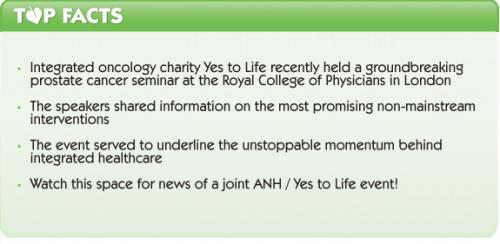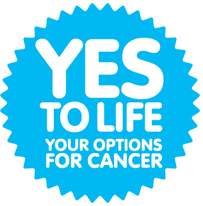A recent groundbreaking prostate cancer seminar entitled “The Power of Choice”, produced by integrated oncology charity Yes to Life and sponsored by the Really Healthy Company, brought together clinicians, patients and health journalists to discuss options for prostate cancer. Speakers shared key advances and breakthroughs from the most promising non-mainstream interventions, which further underpin the influence of diet and lifestyle on the disease. The seminar took place at the Royal College of Physicians in London and was hosted by renowned BBC Broadcaster, Sheila Dillon.

Vital anti-cancer strategy
The clinicians included Professor Ben Pfeifer, who shared patient data analyzed over a period of 14 years, oncologist Dr Robert Thomas presenting the results of his recent trials on Pomi-T and Dr Damien Downing, who set out a range of options for people with prostate cancer. In addition, leading UK health journalist Jerome Burne introduced the subject of ketogenics, and Sheila Dillon, host of BBC Radio 4’s “The Food Programme”, highlighted the key role of food and nutrition in anti-cancer strategies. Unusually, individual patient experiences were also featured, highlighting cases where diet and lifestyle interventions had created a seminal turning point in their healing.
Jenny Phillips BSc attended and reported on the day’s proceedings. She asked the important question: “Whilst the individual case studies were hugely interesting, what does the clinical data show in respect of integrative cancer care?” Her answer was highly positive: “We were privileged to hear from three clinicians, all of whom used data to show convincingly that nutritional and lifestyle therapies can play a vital role in an anti-cancer strategy”.
Unstoppable momentum
Jenny summarised the unstoppable momentum that events like this capture and further inspire. “Integrative healthcare isn’t going away. There are too many of us who have seen the light and are mobilising ourselves to help more people to help themselves. We need our medics to be part of this process – and so to bring together the very best of conventional and complementary treatments”.
Long proponents of the power of epigenetics over genetics in both health prevention and healing, we have written much over the years about the influence of nutrition, exercise and other lifestyle factors on chronic disease. A year ago, we featured the documentary on prostate cancer created by Peter Starr out of his own journey back to health. His message is still as current today as it was then: “You can change the outcome of your disease by changing your lifestyle”. Highly recommended watching for any man over 40, but the tenets of nutrition and lifestyle intervention are applicable no matter your gender, age or state of health.
You can find more information on Yes to Life events and a copy of some of the presentations online. And watch this space for breaking news on a combined ANH-Intl / Yes to Life event in 2014…








Comments
your voice counts
21 November 2013 at 12:15 am
Integrated medicine is a crafty term used by mainstream medicine for tiny bits of naturals/alternative to appease the alternative/natural seeking public, but these are only to alleviate side effects of toxic, and mostly useless allopathic medicines.
Prostate cancer can be prevented by not consuming the two allergens that inflame the prostate, as that inflammation allows easy entry for the cancer nucleus and cancer complex to start and fuel a malignancy at that site, The two alergens are acetic acid, vinegar, and the plant phenol, naringenin, as found in ALL citrus but very high in tangerenes. Clark H R, PhD ND, 2007.
Why is this not promoted by the dietician, oncologist, health officials? Unless published in the now exposed as corrupt med journals, science based data is not recognised, therefore remains illegal for it to be even mentioned.
Here's the story.
Dr. Robert Good, of the US, the world leader in immunology, carried out the first bone marrow transplant, and had published over 2000 medical papers by the mid 1980s, when he discovered the nutrition based, enzymatic CURE for pancreatic cancer. He was refused publication in ALL the corrupt* med journals.
*http://www.naturalnews.com/News_000614_Wyeth_medical_journals_ghostwriting.html
The US 'gatekeepers' of Cancer Inc. ensure that no cancer cure is published, to protect their 1/3 trillion dollar annual Indusry. In the UK they still have the Cancer Act of 1939 that PROHIBITS the publication of ANY cancer cure.
H R Clark, PhD ND, carried out over half a million repeatable, so scientifically valid bio-resonance tests to precisely identify the specific pathogens, dyes, heavy metals, moulds, radio-active compounds etc that cause all cancers, and traced their pathways. Dr Clark needed to publish privately, so her work must remain 'unrecognised'.
Other cures work as they address the causes identified by Dr Clark. They are those of Drs. R. Beck and R. R. Rife, (electonic resonance); Dr Burzynski, (his own DNA meds); Germany's ozone, that cured Pres. Reagan's lung cancer; essiac that cured Sen. Ted Kennedy's son's 'incurable' bone cancer, (this herbal formula was given to us in 1922 by NW Am. Ojibway herbalists. After the death of essiac's recipient, a Canadian nurse, all her records were burned by the Canadian Govt.); and the herbals of Dr. M. McCain, H Hoxey and Jason Winters.
20 January 2014 at 4:41 pm
Hi Thomas, thanks for your comment. We think you’re being unnecessarily harsh about integrated/integrative medicine (IM)! For one thing, numerous suggestions have been proposed for a widely acceptable definition of IM, with no sign of a consensus. Definitions are always problematic, for two main reasons: a) unless great care is taken, they can be, and are, interpreted differently by different people at different times and under different circumstances; and b) if one particular definition proves popular, it is almost inevitably hijacked and corrupted from the original intention of the framers. Often, this corruption comes directly from those opposed to the principle enshrined in the definition. Our advice with all definitions, and especially that of IM, is this: approach with caution!
Take a look at this definition of IM, from the British College of Integrated Medicine: “[IM] is a compassionate, proactive approach to healthcare which combines the very best of all medicines - orthodox, complementary, psycho-spiritual and self-help - for the treatment of illness and the prevention of illness...[in IM] health is seen as a variable which is dependent on a whole range of factors [that] includes how we eat and exercise, the toxins we take into our systems, the state of our nervous system and our state of mind. The rapidly growing science of Psycho-Neuro-Immunology (PNI) has shown us incontrovertibly that our state of mind directly affects the functioning of all tissues in our bodies. High levels of prolonged stress and emotional distress can flatten our immune systems...unless we understand how to change an individual’s state of mind, self-esteem, motivation, security, happiness and fulfilment, very little changes.”
This is an admirably wide-ranging definition - mainstream medicine has little time for psychoneuroimmunology, for example - but of course it’s the implementation that matters. We must look at how these goals are carried through in individual modalities.
Thus far, IM has little to shout about in the UK, whereas institutions like the Memorial Sloan-Kettering Cancer Center in the USA are much further along the road: http://www.mskcc.org/cancer-care/integrative-medicine. On the other hand, even the Memorial Sloan-Kettering shunts its non-mainstream treatments under the heading ‘Symptomatic Treatment’ and emphasises its complementary nature with respect to conventional medical care.
So IM is, at best, a step along the road. We’re far more excited about the prospects of functional medicine (FM). As we said in an article on the topic - http://anhinternational.org/news/anh-feature-dieticians-and-nutritional-therapists-never-the-twain-shall-meet - “FM helps manage an individual’s environment in such a way that his or her unique response is optimised, taking into account genetic predisposition and make-up.” In other words, it actually achieves what is promised by certain definitions of IM.
Your voice counts
We welcome your comments and are very interested in your point of view, but we ask that you keep them relevant to the article, that they be civil and without commercial links. All comments are moderated prior to being published. We reserve the right to edit or not publish comments that we consider abusive or offensive.
There is extra content here from a third party provider. You will be unable to see this content unless you agree to allow Content Cookies. Cookie Preferences